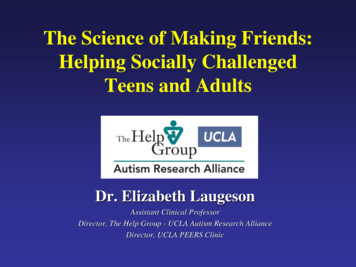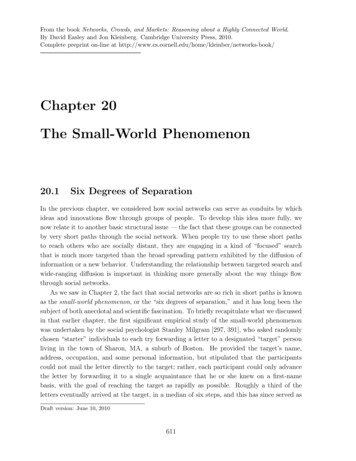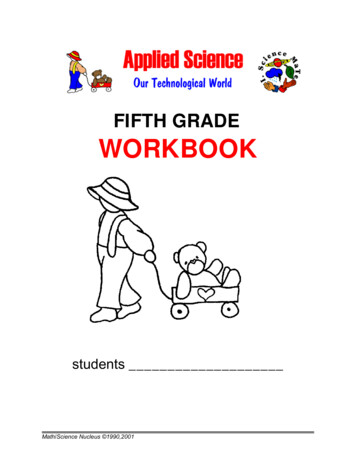
Transcription
The Science of Making Friends:Helping Socially ChallengedTeens and AdultsDr. Elizabeth LaugesonAssistant Clinical ProfessorDirector, The Help Group - UCLA Autism Research AllianceDirector, UCLA PEERS Clinic
AcknowledgementsFunding SupportNIMH U54-MH-068172 (Sigman, PI)NIH T32 MH17140 (Leuchter, PI)Shapell and Guerin Foundation (Laugeson, PI)Semel Scholar Award (Laugeson, PI)Friends of the Semel Institute (Laugeson, PI)Organization for Autism Research (Laugeson)Research CollaboratorsFred Frankel, Ph.D., ABPP (co-developer)Andrew Leuchter, M.D. (post-doc mentor)Alex Gantman, Psy.D.Catherine Mogil, Psy.D.Helena Johnson, Ph.D.Mirella Dapretto, Ph.D.Josh Mandelberg, M.D.Jeff RudieNatalie ColichMina Park, Ph.D.Enjey Lin, Ph.D.Administrative SupportYasamine Bolourian, M.A.Jessica HopkinsShannon Bates, M.A.Lara Tucci, M.A.Ashley R. Dillon, Ph.D.Jennifer Sanderson, Psy.D.Ruth Ellingsen, M.A.Clare GorospeJilly Chang, Ph.D.THG Research AssistantsMariya KrivStephen KappKaely OrenskiGeorgia Yu, M.A.Dali Tung, M.A.Jan StolpeDawn Mitchell, M.A.Rosanna Rivero, M.A.Mary Goodarzi, M.A.Alex FriedmanSarah BohlmanLindsay HenrySummer VilkinsMaile Adolphson Horn, M.A.Michelle Jackson, M.A.Sarah TaylorMelissa Wasserman,M.A.Lindsy Hughes, M.A.Ellie MellonDaniel Janulaitis, M.A.Rohini BagrodiaKathryn FitzpatrickTiana Bayrami, M.A.Jason TineroElizabeth Shipley, M.A.Jessie SanchezKhadija NoorbhaiUCLA Research AssistantsJin Lee, M.A.Amanda LenvinCordelia RossKristine McGlennenDana LiebermanSiena WhithamAllison VreelandLucy VoChloe KoefflerAlea Baron, M.A.Laura KnollAhoo Karimian, M.A.Kathleen Jorgenson, M.A.Rebecca Fountain, M.A.Erin Cornack, M.A.Emily Chen, M.A.Kandyse ChristopherDevi Beck-PancerBen SchwartmanElan Javanfard, M.A.Meredith Kalies, M.A.Meagan CroninLyndsay BrooksDavid DiazCecilia CostaWe gratefully thank the families who haveinspired us and made this research possible!
Overview of Lecture Importance of friendshipConsequences of social deficitsOverview of PEERS Effective methods for teaching socialskills Ecologically valid social skills––––Conversational skillsStarting individual conversationsEntering group conversationsHandling teasing Brief summary of research findings Current research Resources
Why Study Friendships?Having one or two closefriends: Predicts later adjustment inlife Can buffer the impact ofstressful life events Correlates positively withself-esteem Increases independence Correlates negatively withdepression and anxiety(Buhrmeister, 1990; Matson, Smiroldo, & Bamburg, 1998; Miller &Ingham, 1976)
Consequences of Peer RejectionPeer rejection is one of thestrongest predictors of: Juvenile delinquency Early withdrawal fromschool Mental health problems(Buhrmeister, 1990; Matson, Smiroldo, & Bamburg, 1998;Miller & Ingham, 1976)
Identifying the Peer Rejected andSocially Neglected Peer rejection Teasing and bullying Bad reputations Autism, ADHD, Mooddisorders, Conduct Disorders Social neglect Isolated and withdrawn Ignored and unnoticed Autism, Anxiety, Depression Both lack closereciprocal friendships(Volkmar & Klin, 1998; Bauminger & Kasari, 2000; Orsmond, Krauss, &Seltzer, 2004; Koning & Magill-Evans, 2001; LeCouteur et al., 1989;Marks, Schrader, Longaker, & Levine, 2000; Ghaziuddin & Gerstein,1996; Twatchman-Cullen, 1998; Hemphill & Siperstein, 1990;Church, Alisanki, Amanullah, 2000)
Categories of Peer Acceptancein AdolescenceAverage (55%)Popular (15%)Peer Rejected (15%)Socially Neglected (15%)The Science of Making Friends(Laugeson, 2013)
PEERS Program for the Education & Enrichment of Relational Skills Research launched in 2004 atthe UCLA Semel Institute Manualized group treatment Parent-assisted programPhoto of PEERS courtesy of Associated Press– Concurrent parent and teen/youngadult sessions– Parents provide social coaching 14-16 week curriculum– 90 minute weekly sessions Evidence-based– Teens in middle and high school Autism, ADHD, ID, FASD– Young adults with AutismUCLA PEERS Clinic(310) rs
Evidence-Based Methods forTeaching Social Skills Didactic lessons Concrete rules and steps of social etiquette Ecologically valid social skillsPhoto of PEERS courtesy of Associated Press Role-play demonstrations Model social behavior Appropriate and inappropriatedemonstrations Behavioral rehearsal exercises Practice with coaching Homework assignments Practice in natural social settings Helps generalize skills Parent/caregiver or teachercoaching(Matson, 1984; Davies & Rogers, 1985; Fleming & Fleming, 1982;Mesibov, 1984; Gresham, Sugai, & Horner, 2001; Gralinski &Kopp, 1993; Rubin & Sloman, 1984, Frankel & Myatt, 2003;Rao, Beidel, & Murray, 2008; Laugeson et al., 2008)
The Science of Making Friends:Helping Socially Challenged Teens and Young Adults(Laugeson, 2013) Parent book based on research fromUCLA PEERS Clinic Friendship skills Handling peer rejection and conflict Parent section– Narrative lessons– Social coaching tips Teen and young adult chaptersummaries Chapter exercises Companion DVD Mobile App: FriendMaker
Summary of Friendship SkillsMaking and Keeping Friends: Finding and choosing good friendsConversational skillsStarting and ending conversationsExiting conversationsElectronic communicationGood sportsmanshipGet-togethersHandling Peer Conflict and Rejection: ArgumentsTeasingCyber bullyingRumors and gossipPhysical bullyingBad reputationsThe Science of Making Friends(Laugeson, 2013)
Development of Rules and Steps ofSocial Behavior Ecologically valid social skills DO’S Common social errorscommitted by those with socialdifficulties DON’TS Create rules aroundecologically valid skills andcommon social errors Break steps down intoconcrete partsPhoto of PEERS courtesy of Associated Press
Clinical ExampleQUESTION:What are commonsocial errorscommitted by teensand young adults whentalking to others?
Role-Play:Conversational SkillsThe Science of Making Friends DVD and Mobile App(Laugeson, 2013)
Common Conversational Error:Conversation Hogging One-sided conversations Elicit fewer extended responsesfrom others Fail to identify common interests Use repetitive themes Perseverate on personal interests Disregard the other person’sinterests Autism, ADHD, BipolarDisorder Rule: Don’t be a conversationhogThe Science of Making Friends(Laugeson, 2013)
Perspective Taking Questions:Conversation Hogging What was thatlike for Ben? What did Benthink of Alex? Will Ben want totalk to Alexagain?The Science of Making Friends DVD and Mobile App(Laugeson, 2013)
Role-Play:Conversational SkillsThe Science of Making Friends DVD and Mobile App(Laugeson, 2013)
Common Conversational Error:Policing Poor social cognition Difficulty predicting social world Dichotomous thinking Black-and-white thinking Rule-driven Notice rule violations Feel compelled to point outrule violations Autism, OCD, Anxiety Rule: Don’t policeThe Science of Making Friends(Laugeson, 2013)
Perspective Taking Questions:Policing What was that likefor Ben? What did Benthink of Alex? Will Ben want totalk to Alexagain?The Science of Making Friends DVD and Mobile App(Laugeson, 2013)
Role-Play:Conversational SkillsThe Science of Making Friends DVD and Mobile App(Laugeson, 2013)
Common Conversational Error:Getting Too Personal Poor social cognition Difficulty taking on theperspectives of others Difficulty picking up on socialcues Asks personal questions ofothers Shares too much information Autism, ADHD, MoodDisorders Rule: Don’t get too personalThe Science of Making Friends(Laugeson, 2013)
Perspective Taking Questions:Getting too Personal What was that likefor Ben? What did Benthink of Alex? Will Ben want totalk to Alexagain?The Science of Making Friends DVD and Mobile App(Laugeson, 2013)
Rules and Steps for StartingIndividual Conversations Find a common interest Make a comment Ask a question Give a compliment Trade information Ask the person about him/herself Usually related to common interest Answer your own questions Ask follow-up questions GOAL: Find common interests Friendships are based on commoninterestsThe Science of Making Friends(Laugeson, 2013)
Role-Play: Peer EntryStarting an Individual ConversationPerspective TakingQuestions: What was that likefor Ben? What did Ben thinkof Alex? Will Ben want to talkto Alex again?The Science of Making Friends DVD and Mobile App(Laugeson, 2013)
Clinical ExampleQUESTIONS:What are most teens andyoung adults told to dowhen trying to meet a newgroup of people?What is a common socialerror made by teens andyoung adults whenentering conversations?
Role-Play: Peer EntryEntering Group ConversationsPerspective TakingQuestions: What was that likefor the group? What did the groupthink of Yasamine? Will the group wantto talk to Yasamineagain?The Science of Making Friends DVD and Mobile App(Laugeson, 2013)
Steps for Entering Group Conversations Watch / Listen Watch from a distance Using a prop is helpful Listen for the topicIdentify common interestsMake periodic eye contactWatch to see if you knowsomeone Make sure they’re talking nicely Wait Wait for a pause in theconversation Move closer Arm’s length away Join Make a comment or ask a questionthat is ON TOPICThe Science of Making Friends(Laugeson, 2013)
Role-Play: Peer EntryEntering Group ConversationsPerspective TakingQuestions: What was that likefor the group? What did the groupthink of Yasamine? Will the group wantto talk to Yasamineagain?The Science of Making Friends DVD and Mobile App(Laugeson, 2013)
Clinical ExampleQUESTIONS:What are most teens andyoung adults told to do inresponse to teasing?What are the commonsocial errors made byteens and young adults inresponse to teasing?
Rules for Handling Teasing Do not walk away, ignore the person,or tell an adultDon’t show you’re upset or teasebackAct like what the person said did notbother youProvide a SHORT COMEBACK thatshows what the person said was lame: Whatever!Anyway So what?Big deal!Who cares?Yeah and?And your point is?Am I supposed to care?Is that supposed to be funny?(Shrug shoulders)(Roll eyes)Then walk away or remove yourselfThe Science of Making Friends(Laugeson, 2013)
Role-Plays:Handling TeasingMale ExampleFemale ExampleThe Science of Making Friends DVD and Mobile App(Laugeson, 2013)
PEERS Research:Parent-Assisted for Teens with Autism
PEERS Research Snapshot:Parent-Assisted for Teens with Autism108Treatment6Waitlist420Mean Change in ScoresImprovement in Social Responsiveness itionHosted Get-togethers5Mean Change in ScoresMean Change in ScoresImprovement in Social Skills43Treatm entWaitlis t210Condition(Laugeson et al., 2012)
PEERS Research Snapshot:14-week Follow-up for Teens with AutismSocial Skills Scale T1-T3 (p 0.01)Social Responsiveness Scale T1-T3 (p 0.01)Mean Scores9085Treatment Group807570T1T2858075706560Treatment GroupT1T3T2T3Testing TimeTesting Tim eHosted Get-Togethers - Adolescent ReportT1-T3 (p 0.05)5Mean ScoresMean Scores9543Treatment Group210T1T2T3Testing Tim e(Laugeson et al., 2012)
PEERS Research Snapshot:New Findings at 14-week Follow-upfor Teens with AutismParent ReportTeacher ReportSocial SKills Scale T1-T3 (p 0.03) *116114112110108106104102110Treatment GroupMean ScoresMean ScoresProblem Behaviors Scale T1-T3 (p 0.01) *105100Treatment Group95908580T1T2Testing TimeT3T1T2T3Testing Time(Laugeson et al., 2012)
PEERS Research:Caregiver-Assisted for Adults with Autism
PEERS Research Snapshot:Caregiver-Assisted for Adults with AutismImprovement in Social Responsiveness (Total)Improvement in Overall Social Skills5TreatmentWaitlist0-5-1020151050-5-10Mean Change in ScoresMean Change in Scores10TreatmentWaitlistConditionConditionMean Change in ScoresImprovement in Empathy105TreatmentWaitlist0-5Condition(Gantman et al., 2012)
PEERS Research Snapshot:Caregiver-Assisted for Adults with Autism1050-5-10-15TreatmentWaitlistConditionMean Change in ScoresFrequency of Hosted quency of Invited Get-TogethersMean Change in ScoresMean Change in ScoresDecrease in man et al., 2012)
PEERS Long-term Follow-upAssessment for Teens with Autism Data was collected 1-5 years posttreatment 53 of 82 potential subjects– 64% response rate Mean age at follow-up was 17.5 yearsand grade level was 11.4 Mean time to follow-up was 29months Maintenance of treatment gains withadditional improvements Highlights power of parent coaching(Mandelberg et al., in press in Journalof Mental Health Research inIntellectual Disabilities)
Current Research Study:PEERS Virtual CoachPEERS Virtual Coach(Laugeson, PI) High-functioningadolescents with AutismSpectrum Disorder N 30 Test the effectiveness of a“virtual coach” for teenswith ASD Compare three groups:– PEERS parent-assistedtreatment as usual– PEERS parent-assistedwith virtual coach– Delayed treatmentcontrol
Current Research Study:PEERS for PreschoolersPEERS for Preschoolers(Laugeson & Park, PIs) 16-week manualizedsocial skills group 4-6 year old highfunctioning children withAutism Spectrum Disorder N 30 Puppet-facilitated lessons Parent-assisted Compare treatment todelayed treatment control
UCLA PEERS Research Partners Virginia Tech– ASD (Teens and adults) fMRI – biomarker of treatment outcome– ADHD– Traumatic Brain Injuries Bar Ilan (Israel)– Manual translated into Hebrew– Randomized controlled trial– Teens with ASD Marquette University– Two published papers: Replication study – social anxiety andparenting stressEEG – first biomarker of treatmentoutcome South Korea– Manual translated into Korean– Randomized controlled trial (inpress in Autism Research)– Teens with ASD– Korean manual published in 2013
PEERS Programs PEERS School-Based Programfor Adolescents– 16-week teacher-facilitated daily class– Village Glen School at The Help Group PEERS for Young Adults– 16-week caregiver-assisted weeklyprogram (unpublished)– UCLA on Mondays 6:00-7:30 pm PEERS for Preschoolers– 16 week parent-assisted weeklyprogram (unpublished)– UCLA on Tuesdays 3:30-5:00 pm PEERS for Adolescents– 14-week parent-assisted program– UCLA on Wednesdays 4:30-6:00 and6:30-8:00 pm
PEERS Parent-Assisted Manual(Laugeson & Frankel, 2010) PEERS Treatment Manual– Offered in over a dozen counties– Translated into six other languages SpanishFrenchHebrewKorean (published)FinnishSwedish PEERS Certified Training– UCLA Parent-assisted treatment: November 5-8,2013 and March 11-14, 2014 School curriculum: February 2014– National and international trainings– 3-4 day training (24 hours total)Manuals available for purchaseIn the exhibitor hall
The PEERS Curriculum forSchool-Based Professionals:Social Skills Training for Adolescents with Autism Spectrum Disorder(Laugeson, 2013) Published PEERS curriculum Teacher-facilitated 16-week curriculum Daily lesson format Friendship skills Peer conflict and rejection Parent handouts includedManuals available for purchaseIn the exhibitor hall
Please join usfor a booksigning in theexhibitor hallafter the lecture
Contact InformationUCLA PEERS Clinic(310) rsFacebook: UCLAPEERS
from others Fail to identify common interests Use repetitive themes Perseverate on personal interests Disregard the other person's interests Autism, ADHD, Bipolar Disorder Rule: Don't be a conversation hog The Science of Making Friends (Laugeson, 2013)










